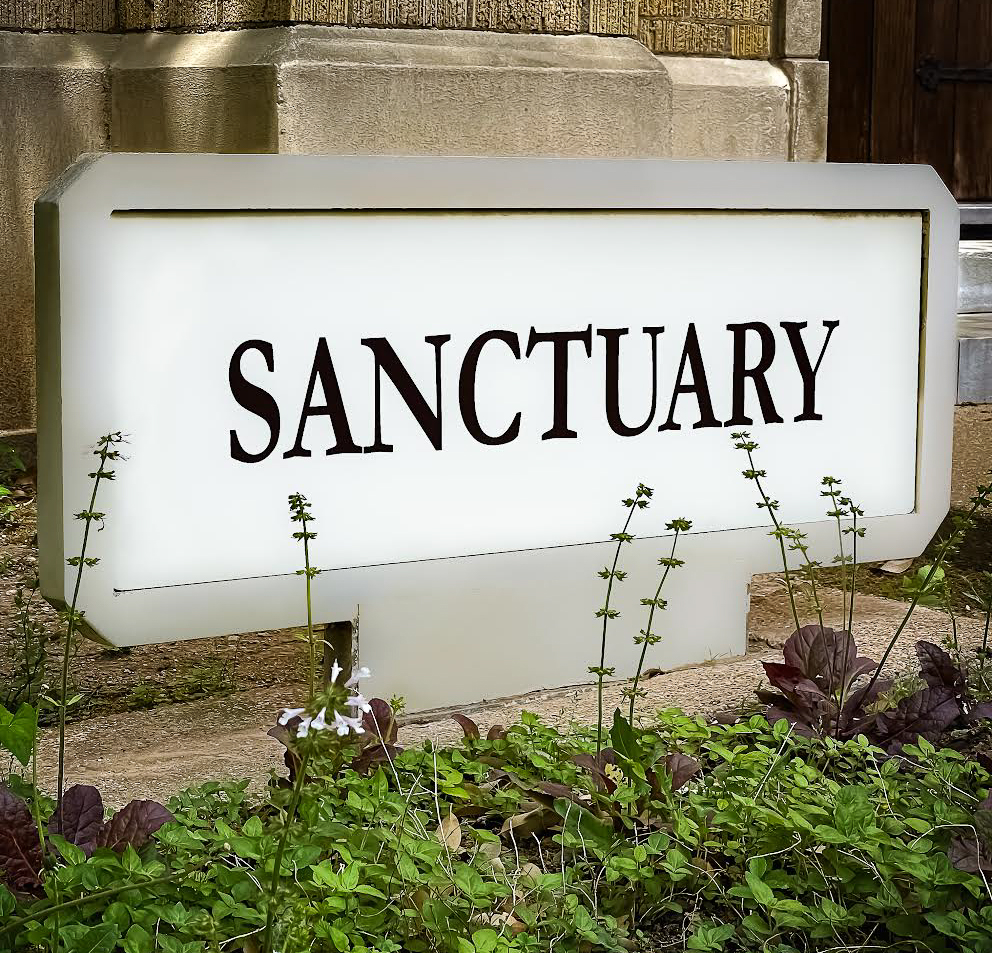My Private Sanctuary
[ theme music rises ]
It’s been said that better questions lead us naturally to better answers, and that it’s in not knowing that we open the doorway to knowing. I’m Scott Lennox and you’re listening to The Beautiful Question, a consideration of things that truly matter in a complex world.
[ brief pause ]
We often have no idea how deeply we’ve affected someone’s life until long after the time we spent with them.
Join me this week as we consider what it means to be someone’s personal sanctuary, perhaps even our own.
Stay with me.
[ brief pause as music fades ]
My time in theology school in the seventies was very well-spent, but it grew increasingly obvious to me that I had much deeper business to attend to. Before I could serve other people, I needed to stop and deal with the traumas I had lived and the toll they took on me mentally and emotionally. After all, how was I to be useful to someone else if I wasn’t intentionally taking care of myself?
As I was leaving the school for the last time, the dean challenged me in the hallway. “Why are you leaving the ministry?” he asked. “I’m not leaving ministry,” I told him, “I’m leaving the seminary. I know that I’m a born pastor.” Not satisfied with my answer, he pressed the matter and asked if my statement was a philosophical one or a theological one. “It’s neither,” I said. “It’s an ontological statement—it’s how I’m made. I know I was born to help other people, serving or ministering to them in some way.”
He scowled and went back into his office, loudly banging the door to make his point.
[ brief pause ]
A few months later, my closest friend in school, Ken Cargle, invited me to attend his ordination ceremony. Not wanting to draw attention to myself, I arrived late on purpose and sat in one of the back pews of the large Dallas church where the service was held. The sanctuary was filled to overflowing with family and friends and classmates. There were also many of the professors who had taught us, several of whom spoke that afternoon with well-deserved praise for Ken.
Then it was his turn to speak.
After talking about some of the things he learned in school and his renewed his sense of purpose as a new minister, he ended by thanking his wife, Saundra, and several people who had been particularly helpful to him. Then, as he ended his closing remarks, he surprised everyone, including me.
“Last of all, and very important to me,” he said, “I want to thank someone who is always there for me, someone who makes me feel safe and listens to me without judgment. Someone I know I can count on if I need to. I want to thank my own private sanctuary, Scott Lennox.”
My face flushed and I wanted to disappear as he pointed toward me. Among the people who turned around were professors who looked at me with consternation on their faces. I still find it hard to describe what I saw in that moment. I remember keeping my eyes on Ken and thinking that I hadn’t done anything out of the ordinary to create such a powerful impact on him. After all, he was my friend and I treated him that way. In fact, we remain friends to this day.
[ brief pause ]
In one of our recent conversations, Ken reminded me of that day, and I assured him that I have never forgotten it. In the forty-five years that have elapsed, each of us has learned so much about the value of being fully present with another person. I assured him that he had been my sanctuary—my safe place—just as much as I had been his.
[ brief pause ]

Photo Editing: Noël Pensock
Perhaps driven by all that’s happened in the past couple of years (and the years before that), I’ve been thinking more than ever about the word “sanctuary” and all it implies. I’ve talked about it more than once in these podcasts and I have no doubt that the need for sanctuary is growing stronger all over the world.
“Sanctuary” is derived from the Latin word “sanctus,” meaning sacred. Dictionaries define it as “a sacred place” or “a place of refuge or asylum,” a place where those within it are free from harm and can find safety and rest and perhaps even comfort.
Every month or so for several years, I cooked for as many as twenty-four friends at a time here in my home. To heighten their experience, I printed menus at the top of which I called my self-styled restaurant Maison du Sanctuaire, or “Sanctuary House.” That’s the name I gave the place when I bought it.
After all I’ve experienced, it’s important that my combined home and studio is a consecrated place of serenity and safety, a calm place where I’m free to be completely myself and where those who visit are welcome to do the same. I also hold the same stance in my counseling practice as I collaborate with people who are learning to live safely and authentically as they reclaim their own lives.
Safety and the freedom to be ourselves are essential parts of the foundation upon which healthy relationships are built. So, too, are listening and acceptance without judgment. Such things contribute to what we can call sanctuary.
[ brief pause ]
So, in real terms, that leads us to this week’s Beautiful Questions. As we further consider what sanctuary is and how to provide it first to ourselves and then to others, I invite you to contemplate the questions and then write and tell me where your considerations take you. You see, I have a vested interest in you and in what you’re doing. As you become safer and happier, so does the world I live in.
Here are this week’s questions.
Question One: What does “sanctuary” mean to you on a personal level and in what ways have you experienced it in the past or are you experiencing it now?
Question Two: What happens when you experience that level of safety with another person?
Question Three: In what ways can you actively provide sanctuary for yourself and then for someone else?
[ brief pause ]
I always look forward to hearing where your considerations take you. Write and tell me about it.
As I say each week,
My Light with Your Light!
[ theme music & sign-off ]
Thank you for joining me in these podcasts as we keep doing the things we can to respond to life in increasingly effective ways. As always, I’m open to your comments and feedback.
You can be further inspired by visiting my friends at Kosmos Journal. That’s K O S M O S Journal. Their mission is to inform, inspire, and engage global transformation in harmony with all life. You can easily find them online at Kosmos Journal dot O R G.
And at thebeautifulquestion.com, you can read the illustrated transcript of each podcast as you listen. You’ll also find an archive of all previous podcasts, including episodes three and four, guided relaxation audios that can help you practice letting go on a daily basis.
If you find these podcasts useful, don’t hesitate to share them or tell others about them. That’s a great way of helping me get a voice of calm and collaboration and balance and encouragement out into the world.
[ brief pause ]
I’m Scott Lennox, and this has been The Beautiful Question.
[ brief pause ]
The Beautiful Question is a One Light production, written, produced, and engineered by Scott Lennox at HeartRock Studios in Fort Worth, Texas, as a way of paying forward to life, being fully present, becoming better engaged with things that truly matter in a complex world, and committing to a healthier future for all of us.
